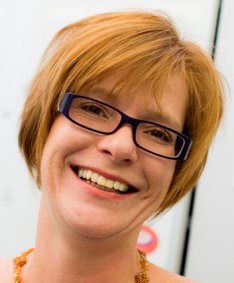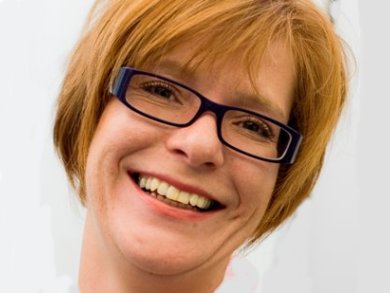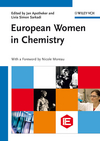2011 is the International Year of Chemistry (IYC 2011) and the centenary of Marie Curie’s Nobel prize in Chemistry. Therefore, ChemViews will introduce interesting women throughout the year.
Uta Wille is Associate Professor at the University of Melbourne, Australia. She followed a career path unique to her from atmospheric to organic chemistry, from Germany to Australia.
Tell us a bit about how your career has developed?
When I started to study chemistry in Germany, I wanted to gain some scientific background to become a conservator of artwork. With no serious chemical background from school, I never thought that chemistry would capture me so much that it would become my profession. But very soon — I think it was the point when I discovered that I could explain observations in organic chemistry with things that I’d learned in physical chemistry, or in other words, when the “network” between the classical chemistry disciplines became tighter and more interwoven — I realized that chemistry was probably the most fascinating thing I had ever done.
When I had to decide in which area I wanted to do my Diploma thesis and my PhD thesis, I didn’t think twice: I wanted to do atmospheric chemistry. I wanted to understand the chemistry that happens around us in the air, how the ozone hole is formed in the stratosphere, why ozone is bad in the troposphere and all that. This brought me to gas phase kinetics and free radical chemistry.
During my PhD, I had lots of opportunities to present my work at international conferences because my PhD supervisor, Professor Ralph N. Schindler, was involved in a European collaborative project.
After my PhD was completed, I was offered a position for a Habilitation in organic chemistry. Rather than changing institutions for a Habilitation, I changed the field. This is a very unusual pathway, and I must say that the major part of my Habilitation was not the easiest time in my life, science-wise, because I had never worked in organic chemistry before apart from the practicals during my studies and did not have the experience that my colleagues had, who had worked in organic chemistry “all their lives”, so to say. But I liked the challenge of doing something completely different and new for me, and now I am glad that I took the risk.
And have you stayed with orgnaic chemistry since then?
I developed a new research area by merging radicals of atmospheric importance with organic synthesis. This led to my current research interests of developing new synthetic methodologies using free radicals, reaction mechanisms and computational chemistry. In addition to this, I am very interested to find out how environmental free radical oxidants damage biosurfaces that are in contact with the atmosphere. Since some time, I feel that I want to get back to my scientific “roots” and do more physical chemistry – with an organic spin. Recently, I got a Laser Flash Photolysis spectrometer into my lab, which will enable me and my group to measure reaction rates in solution and spectroscopy of reaction transients. I am very excited about this.
You received your Habilitation at the University of Kiel and now are Associate Professor at the Universitiy of Melbourne. How did this happen?
During my Habilitation, I took a one-year break to do a Postdoc in Professor Bernd Giese’s lab in Basel, Switzerland, to learn something about radicals in biological systems, especially DNA. I was becoming more and more interested in what environmental radicals do to us.
After completion of my Habilitation, I continued to work as a Privatdozent in organic chemistry for 2–3 years until I got offered an academic position at the University of Melbourne, Australia. They were looking for a new staff member, whose research interests extended beyond the classical borders between the disciplines, and my combination of physical and organic chemistry fitted perfectly. I packed up my husband and we moved to Melbourne. The Australian academic system doesn’t have a Habilitation, and I started “from scratch” as a Lecturer. Since then, I’ve been promoted to Associate Professor and Reader.
How do you like Melbourne?
Melbourne is a great place to be, there is a huge amount of state-of-the-art and breakthrough science happening here, and the system is very supportive. We have great research facilities, for example, my research labs are located in a new institute, where chemists work together with biochemists and other life sciences researchers. It is very inspiring to be surrounded by enthusiastic people who love to talk about their research – in the Australian way: relaxed and very friendly, with a glass of beautiful Australian wine in the hand.
What do you enjoy most about your career?
In principle, as a researcher I can do whatever I want to do – in what other job can you do this? – provided that I get the funding.
A friend once said that being an academic is like being the captain of a ship, either you steer it into a safe harbour or you sink. The latter aspect is, of course, frightening, but the prospect of this is what gets you up in the morning and makes you think about cool and sexy new chemistry.
I am currently a Chief Investigator in the Centre of Excellence for Free Radical Chemistry and Biotechnology of the Australian Research Council (ARC), where I can really realize my passion to work on many aspects of free radical chemistry. This spans from computational chemistry to the development of new synthetic methodologies and exploring reaction mechanisms using physical chemical techniques.
I also like the teaching part of my job (not all aspects), but I like to use my lectures to advertise the beauty and fascination of chemistry to students. Actually, I have quite a number of students who have told me that it was my lectures that convinced them to continue with organic chemistry. This was quite nice to hear …
When did your interest in sciences begin?
Can’t pinpoint when it began, but I guess it was at home. My father, now retired, is a physicist of underwater acoustics, who in his early years travelled on research vessels around the world, mostly in the Atlantic Ocean. He came back from his trips with lots and lots of data, which at that time (before the computer-age) had to be analyzed by hand. He paid my brother and me to help him do this – it was not a huge amount of money, just some pocket money. I don’t know anymore what we had to do, it was some foolproof, stupid work, like counting things, which could be done by young schoolkids. I must admit that I had not a clue what we were counting, but it sets the scene for the environment we had at home.
When I was 10, I participated for the first time in the competition “Jugend forscht – Schüler experimentieren” with a social science project. This got quite a bit of publicity, and because it contained a part where people were interviewed by me, the late Professor Elisabeth Noelle-Neumann invited me to visit her Institut für Demoskopie Allensbach. Two years later, my brother and I participated with a team project for “Jugend forscht – Schüler experimentieren” with a very basic gender study (from my point of view today). Perhaps it was because of the fact that two kids were doing such a big project and people found this cute, but the publicity got really big. We had newspaper and radio interviews and even a spot on a TV report.
What has been your biggest influence/motivation?
Not sure, whether this is really a “motivation”: when I started to study chemistry, as mentioned above, with no serious background in chemistry from school, because I was more into music and arts there, one of the school teachers in my last year said, “Uta, you will never succeed in chemistry”. This kept me going, because I wanted to show him that I would. Later, I realized that I wanted to succeed because I simply love the fact that, in principle, you can explain the world with chemistry – doesn’t work with my 6-year old daughter yet, though.
I believe that the biggest influence on my thinking about new projects and where to go scientifically is a remark made by Bernd Giese. I believe it was during one of the many fantastic dinners in Giese’s apartment in Basel to which I was invited while working in his group. He said that experiments where you only get out what you want, are boring and it’s the unexpected things that are interesting. I always have this sentence in my mind when I talk to students about their projects and want to get them excited by telling them that “nobody has ever done this”.
What advice would you give other women thinking of embarking on a scientific career?
Try to establish a research area that is clearly “you” and is therefore unlikely to cause comments such as “… but she’s just continuing what she’s worked on during her PhD, Postdoc, etc… .”.
Do you think there are still differences between men and women in chemistry?
Not sure about chemistry, but certainly in science and research. There are clear differences between men and women, otherwise there wouldn’t be so many publications out on “why do women publish less than men”, why there aren’t more women Heads of Departments, CEOs of research institutions, etc. Yes, there are differences, and I hope you don’t want the recipe for solving this problem.
Have you experienced any personal struggles typical for women in sciences?
Not that I am aware of, but I haven’t yet tried to become Head of Department …
I think that I am very lucky to be here in Australia, specifically at the University of Melbourne, because this institution is very supportive. All my female colleagues (I mean the academics) have children – this is usually the point where the struggles begin, because everything stands and falls with the availability of child care. We have a 6-year old daughter, who we put into full-time childcare at the age of four months. She was at a university childcare centre, which was really a great place. Professional childcare has been our only option, because we don’t have family here in Australia who could support us. It’s expensive too, but it would be more expensive not to work and miss the joy and fun from that. Now, my daughter goes to school. Schools in Australia have classes until the afternoon, and after this she goes to an after-school-care place, which is located at her school. So, this works out pretty well.
What do you do in your spare time?/What are your other interests?
I’ve always been interested in music and arts. Before I moved to Australia, I had 12 years of training with a professional opera singer, but have postponed my dream of becoming an opera singer until my next life. I’ve also played flute (at a not too bad level) and piano (lousy).
Now, I spend all my free time with arty/crafty stuff, e.g., making and designing clothes and jewelry. This type of creativity is a good counterbalance for the scientific creativity that’s required for my job. At least it keeps me sane.
What would you like to be doing ten years from now?
Being a great scientist and artist – this would be my dream.
To be realistic, I am actually quite happy with what I am doing (despite the usual ups and downs) and could easily imagine that I will be doing very similar things in ten years time. I love teaching and getting students excited about chemistry, I love to do research (although I am not the biggest fan of grant-writing, but who is?) and to give scientific presentations. I would like to get a bit more involved in policy making – and be able to change things that actually bother me. Currently, this is not possible, because I am not in a position that would allow me to do such things, I don’t have enough epaulettes yet.
What else would you like readers of ChemViews to know about you, your experiences, or women in sciences in your country or in general?
I guess Australia is not better or worse compared to other (developed) countries when it comes to women in leading positions. Compared to my male colleagues, women have a much less established network. My Head of Department, Professor Frances Separovic, is a strong promoter of women in science and is really keen on bringing women together to establish strong networks. She is constantly bombarding us (or better: inspiring us) with articles from C&EN or PNAS, etc., where leading female scientists are featured, and which clearly show that the pathway to the top may not necessarily be straight, but can include detours here and there. It is important to realize that such detours are not detrimental to a career, but are on the contrary exciting and make people really interesting and admirable.
Thank you very much for this interview.

Uta Wille, Associate Professor and Reader at the School of Chemistry and BIO21 Molecular Science and Biotechnology Institute, University of Melbourne Australia, received her PhD in 1992 in atmospheric chemistry from the University Kiel, Germany.
She was Hochschulassistent C1 at the Institute of Organic Chemistry, went to the University of Basel, Switzerland, for a Post-doctoral Fellowship at the Institute of Organic Chemistry, and became Privatdozent C2 at the University Kiel, Germany, after her Habilitation there in 1999. She started as a lecturer at the University of Melbourne in 2003.
Selected Awards
- Selby Research Award (2003)
- Dr. Otto-Röhm Gedächtnisstiftung (1998)
More details
Dr. Uta Wille, ARC Centre of Excellence for Free Radical Chemistry and Biotechnology, School of Chemistry, BIO21 Molecular Science and Biotechnology Institute, The University of Melbourne, Victoria, Australia
Selected Publications
- Very Low Energy Electrons Transform the Cyclobutane-Pyrimidine Dimer into a Highly Reactive Intermediate
A. Edtbauer, S. Denifl, V. Viczaino, K. Russel, J. Taubitz, U. Wille, L. Feketeová, R. A. O’Hair, T. D. Märk, E. Illenberger, P. Scheier,
ChemPhysChem 2010, 11, 561–564.
DOI: 10.1002/cphc.200900912 - “Self-Terminating Radical Cyclizations” – new insight into the mechanism from computational studies
U. Wille,
J. Phys. Org. Chem. 2010.
DOI: 10.1002/poc.1808 - Self-Terminating Radical Cyclizations: How are Thiyl Radicals Performing?
K. J. Tan, J. M. White, U. Wille,
Eur. J. Org. Chem. 2010, 4902–4011.
DOI: 10.1002/ejoc.201000655 - Damage of aromatic amino acids by the atmospheric free radical oxidant NO3• in the presence of NO2•, N2O4, O3 and O2
C. Goeschen, N. Wibowo, J. M. White, U. Wille,
Org. Biomol. Chem. 2011.
DOI: 10.1039/C0OB01186J
► see all Women in Chemistry Interviews
European Women in Chemistry
Published: 11 November 2010
ISBN: 978-3-527-32956-4
Author: Jan Apotheker, Livia Simon Sarkadi





